Peter MALONE
Saturday, 18 September 2021 20:01
Woman, The
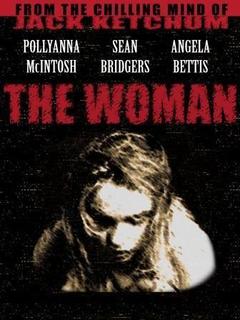
THE WOMAN
US, 2011, 101 minutes, Colour.
Pollyanna Mc Intosh, Sean Bridgers, Angela Bettis.
Directed by Lucky Mc Kee.
This is a disturbing film, not for audiences who do not want to be disturbed. And, it is disturbing on several levels.
The film opens quite surreastically. A woman in the wild is glimpsed. A baby is glimpsed. There are sounds of barking and baying of animals. Images merge into one another for several minutes. When the title comes up, there is a rapid transition to a technicoloured middle American world around a swimming pool, where families are gathered and enjoying a meal and get-together. Chris, the father, seems very genial, though he tends to commands everyone, especially his compliant wife, Belle, to obey his orders and whims. His teenage daughter looks depressed and solitary. His early adolescent son shoots basketballs. There is also a little daughter. Chris is a local lawyer who tries to help people, especially an elderly lady who wants to sell the pool. The contrast between the family and the wild woman is immense.
Chris is also a hunter, sights the woman, goes home to alter the cellar for her and then goes to net her. He installs her, roped and bound, and invites the family to meet his trophy whom he intends to civilise.
The film is a critique of the patriarchal American family, nuclear, not in the family that stays together sense, but more in the potentially explosive sense.
Sequences veer between the ‘normal’ which get less normal as the film progresses showing the feeding, washing and abusing of the captured woman. She is both desperate and vengeful while being humiliated.
Gradually, in school scenes, playground scenes, meals at home and chores around the house, the unease becomes palpable, the tyranny of the father, his blandly charming exterior contrasting with his demands, the meekly submissive housewife, the situation of the daughter and the horrible spectacle of the boy, encouraged by his father, becoming more and more like him. Eventually, the explosion happens with the visit of a concerned teacher. At this stage, violence in a bloody and gory struggle may become too much for some audiences who have been following the drama with interest. But, that is what the film is trying to say, that the polite and even religious and civic veneer will crack, the centre cannot hold and more violence than anticipated will erupt.
By the end, the audience is well aware that this is a film targeting misogyny as the father’s behaviour and attitude’s become more extreme.
Small-budget, with a range of popular songs accompanying the action (the sound seems to clash with the action, the lyrics making comment on it), the film is based on a novel by the director and writer, Jack Ketchum. It is a stand-alone sequel to his film Offspring. He also wrote Red, which Lucky Mc Kee directed, and the torture story, The Girl Next Door. Some commentators have dismissed The Woman as ugly trash. It is often ugly, but the makers and performers are trying to communicate something more serious than trash.
Published in Movie Reviews
Published in
Movie Reviews
Tagged under
Saturday, 18 September 2021 20:01
Greatest Movie Ever Sold, The
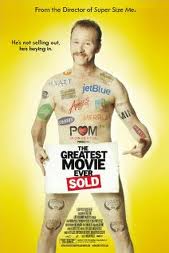
THE GREATEST MOVIE EVER SOLD
US, 2011, 90 minutes, Colour.
Directed by Morgan Spurlock.
Morgan Spurlock has proven himself as a documentarist but also as film-maker with a sly sense of humour and with his tongue in his cheek. This was true of his previous spoof on the search for the leader of Al Quaeda, ‘Where in the Hell is Osama bin Laden?’. He had to take his tongue out of his cheek a bit for the film before that, ‘Supersize Me’, so that he could go on a month’s opposite of a Mc Donalds’ Ramadan, by eating only at the fast food outlets and indulging in Supersizing to discover what it would do to him. He had his satire while he ate it.
This time, a lesser effort than the previous two, he is able to have his cake and eat it too. That is, he spoofs a subject that he is dependent on for making his film.
Making a play on The Greatest Story Ever Told, he indulges it so that all advertising in the film is ‘the greatest’ of everything. And that is what the film is about, advertising, specifically, product placement in the movies.
The film is about the making of the film – but mainly before the film is made. Spurlock genially, sometimes self-deprecatingly, takes us through a process of making a pitch to companies to become sponsors for his film and contribute to the budget. He also approaches marketing experts, program analysis experts and legal advisers. We sit in on all these discussions. Lots of being turned down. Then with Pom Wonderful (a drinks – or, as they say in the US – a beverage company) coming on board, he is off and running fast.
This means that the bulk of the film is about the process and looking behind the scenes of the marketing world – with a number of references to movies. Finally, there are some commercials for the sponsors and a gig on late night television with Jimmy Fallon promoting the film (and we see the extent of all possible locations for promotion, literally everywhere) which becomes part of the film itself.
Spurlock also consults Noam Chomsky and interviews Ralph Nader – and there is an enjoyable gag at the end with Ralph Nader accepting a sponsor’s gift.
We probably knew quite a bit of this already or, at least, suspected it. But, it is enjoyable to watch it in action, extraverted American style.
Published in Movie Reviews
Published in
Movie Reviews
Tagged under
Saturday, 18 September 2021 20:01
Hop
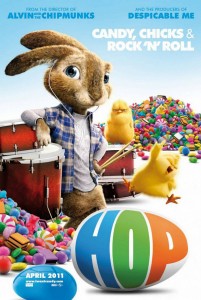
HOP
US, 2011, 95 minutes, Colour.
Voices of James Marsden, Russell Brand, Kaley Cuoco, Hank Azaria, Gary Cole, Elizabeth Perkins, Hugh Laurie, David Hasselhoff, Chelsea Handler.
Directed by. Tim Hill.
This one is for younger audiences whose horizons for Christmas and Easter are bound by Santa Claus and the Easter Bunny.
While one does not want to be too sanctimonious about it, it is still a great pity that we read surveys being done about children’s knowledge of biblical characters and stories and the findings that so many have no real awareness of them (a cultural lack even if religion is not involved). That being said, back to Hop.
While Santa has the north pole for his workshops, easter eggs are manufactured at, where else, Easter Island! Hop is the young son of the old Easter Bunny but would rather go to LA, where else, to play the drums. Off he goes and runs into, literally, slacker, Fred O’Hare? (no relation!), played with cheerful oomph by James Marsden.
This is one of those interactive films, animation and live action (like the director’s previous Alvin and the Chipmunks). Hop has his more than mischievous side (especially as voiced so well by Russell Brand) and causes Fred to miss appointments for jobs which his father (Gary Cole) is hounding him to get.
Wouldn’t you know it, but Fred’s ambition, since he was little and glimpsed the old Easter Bunny on his rounds, was to be, of course, an Easter Bunny.
Meanwhile, on Easter Island, a revolution is brewing. The chicks who fly the Bunny’s sleigh, led by the dominating Carlos, are being marshalled into protest and revolt. After some adventures, both Fred and Hop arrive on Easter Island, are tied up (fortunately, Fred is tied with licorice and makes a bite-through escape) but overcome Carlos and his engagingly dumb sidekick (sidechick), Phil, who is ground control for the sleigh but is easily distracted and the revolution comes to a literal crashing halt. Since both Carlos and Phil are voiced by Hank Azaria, they are both amusing characters and are a foil to Hugh Laurie who voices the Easter Bunny.
Sounds a bit better than might have been thought – and it is, though strictly for the little child, it could be for adults and for the real children.
Published in Movie Reviews
Published in
Movie Reviews
Tagged under
Saturday, 18 September 2021 20:01
Frankenstein/ National Theatre
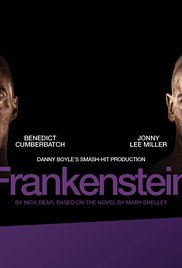
FRANKENSTEIN
UK, 2011, Colour.
Benedict Cumberbatch, Jonny Lee Miller.
National Theatre UK Live.
Directed by Danny Boyle.
During its season at the National Theatre in London, the roles of Victor Frankenstein and the Creature were performed alternately by Benedict Cumberbatch and Jonny Lee Miller. This review is of the Cumberbatch as Creature and Miller as Frankenstein performance.
The filming of live performances from London for overseas viewing has proven a very successful program. The advantage for the cinema audience to compensate for the experience of not being actually in the theatre is that of close-ups of actors, of differing angles of photography, including overhead, making for a strong impact.
The credentials for this play are very good (as explained in a documentary preceding the screening with interviews, discussions of Mary Shelley and her work with scenes from the 1931 film version). Nick Dear has written a strongly verbal play which requires attentiveness for the richness of the themes. Danny Boyle, collaborating with cast and an arrestingly elaborate staging, has brought the 19th century into the 21st.
Benedict Cumberbatch is a somewhat gangly actor. He capitalises on this in an extraordinary opening where he mimes being born, struggling to find his feet and balance, finally being able to stand and face life. He continues this ability to present a very physical creature but one who grows in capacity for reflection, for education, for cultural awareness, for acknowledging his loneliness and his need for a bride like himself. There is a great deal of pathos in his characterisation. When all seems to go well for him and the Doctor creates a bride and then destroys it, the Creature seeks and wreaks revenge, acknowledging that he has truly become a man because he has learnt hatred, lying and shocking, violating violence. Nick Dear and Danny Boyle point out that in the Frankenstein films, the Creature does not or cannot speak. This play restores his voice.
Jonny Lee Miller comes more into his own as Frankenstein in the latter part of the play. The first half is more devoted to the Creature, his self-discovery, the friendly encounter with the Blind Hermit, the fear and loathing of ordinary people. His encounter with little William we can acknowledge as sad. But it introduces us to the proud, yet cowardly, Frankenstein, who does not know how to relate, even to his family, to his fiancée, Elizabeth (Naomie Harris), or to love anyone. He is reclusive, obsessive, arrogant in the name of science, going to Scotland and finding corpses to create the Bride, defying the Creature maliciously and returning to marry only to find that the Creature has destroyed his future. By the end of the play, the audience understands Frankenstein more but can feel little sympathy for his fate.
Ideas were important for Mary Shelley, coming into the Romantic era of the 19th century after the Enlightenment and the Age of Reason of the 18th. Can a mere human, no matter how brilliantly intelligent, have the right to create life? Is this not God’s role? And what is the result of this hubris? Only destruction. The Frankenstein story, which has become a significant myth or archetypal story, is always cautionary about the potential for science and its claims for bettering the world and the human condition (but at what physical, mental, moral and religious cost?).
All these issues are voiced in the play. In the context of the drama, they can be heard from the different points of view. Interestingly, it is Elizabeth who does not recoil in horror from the Creature but admires what her husband has achieved, but it is also she who raises the God and hubris question. They seem more important, as Nick Dear and Danny Boyle discuss in the initial documentary, because of the increasingly less presence of God in modern discourse, especially about science. Mary Shelley’s work is even more relevant in modern times.
Published in Movie Reviews
Published in
Movie Reviews
Tagged under
Saturday, 18 September 2021 20:01
Wasted on the Young
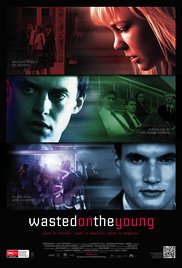
WASTED ON THE YOUNG
Australia, 2010, 97 minutes, Colour.
Oliver Ackland, Adelaide Clemens, Alex Russell, Rhonda Findleton, T. J. Power
Directed by. Ben C. Lucas.
We all know that youth is wasted on the young. This look at high school students (in Perth) seems to prove that this is the case, especially when they themselves become ‘wasted’.
It was something of a surprise to find that the students we are watching are not from poor homes or inner city slums. They are from quite wealthy homes (which boast of their affluence) and attend an expensive private school – demonstrating very little credit for their educational abilities. As with films like Larry Clark’s quite scathing look at New York youngsters and their behaviour (especially with drugs and sexuality), Kids (1995), there are no adults to be seen in this film. Parents are mentioned but absent. The principal’s office is seen but not the principal. There seem to be no teachers or supervisors, especially when brutal fights (signalled by instant multiple text messaging) break out in the school grounds. No police.
So, is this a film for the kinds of characters shown in the film? Or, is it a film for parents or teachers? It certainly would be interesting to be a fly on the wall were students, parents and teachers to watch the film together and then discuss it. And to hear how ‘realistic’ it is.
Come to think of it, variations on this kind of story make their way to newspapers and television reports.
The audience has to be alert at times as the narrative is not simply linear, especially with the opening and three boys leaving a girl on the hills near the sea (our initial suspicions are later justified), then the plot building up to this episode (with some later sequences clarifying what happened). In fact, there are a number of sudden, without warning, shifts in time.
Basically, this is a story of two boys in their final year at school who become stepbrothers as their parents marry. Zack (Alex Russell in a credible interpretation of high school arrogant bullying, presumption and untouchability) is the swimming jock, centre of popularity and unscrupulous sexually. Darren (Oliver Ackland, looking a bit too old for his high school age but presenting a serious and brooding, basically decent young man) is preoccupied with his computers and science project. The other central characters is Xandrie (Adelaide Clemens who has the difficult role of being nice but then a very hard done by victim) who is keen on Darren but is set on by Zack and his swimming champion buddy, Brook (T.J. Power who does arrogant and nasty, especially in his violent attack on Darren, all too obnoxiously).
There are a number of other characters, friends and girls, who show how shallow young people’s outlooks can be, keen on the good time, voyeurs of brutality, gathering like sheep at the ring of their mobiles. (The film is constantly reminding us that we live in a technological age and the young are dependent on social networking.)
Finally, there are echoes of the Columbine High School shootings and the inherent violence underlying arrogance and exploitation even at high school level. Some commentators have said that the writer-director is too pessimistic about today’s young people. Maybe, but his drama is meant to mirror and to warn.
Published in Movie Reviews
Published in
Movie Reviews
Tagged under
Saturday, 18 September 2021 20:01
Inside Job
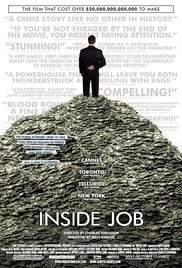
INSIDE JOB
US, 2010, 105 minutes, Colour.
Narrated by Matt Damon.
Directed by. Charles Ferguson)
For most of us, the world economic meltdown of 2008 seems incomprehensible as it raises so many questions as to how alleged financial experts could have been so wrong, so deceitful, so greedy, so amoral if not immoral, in their playing with, unscrupulously gambling, with people’s, institutions’ and nations’ money.
I would not like to have to do an exam on what I learned and remember from watching Inside Job, the details and the intricacies, let alone the terminologies, were too much for me. But, I am glad (in a morbid kind of way) that I have seen the film.
For those in the money know, there is a lot of information about how the American banks, especially, the bankers, the financial advisers to the Bush, Clinton, Bush and Obama administrations got their positions and maintained them, despite the upheavals. While many of the top people involved declined to be interviewed for the film, there are enough interviews to explain what went on. (The academics from American universities who sit or sat on bank boards, wrote highly paid papers and acted as government consultants, come across as an alarming group of mercenary types as well.)
Interestingly, the film opens with the crisis in Iceland and its bankruptcy in 2008 offering some background as to how this could come about. This gets us in the vein to explore the American situation and its consequences. As we listen (without always understanding the detail and keeping abreast of the events), we realise that we are not looking at a group of naive innocents who were doing their best in terms of honesty and open fair dealing. We are looking at a culture that fostered greed and risk, that was made up of many men (more than women) who aspired to a lavish, sometimes decadent, lifestyle, many of whom still do not have the decency to be honest and who remain in positions of power and influence. Statistics about bonuses (to which we have become accustomed, perhaps) are still appalling in the huge (sometimes ultra-huge) amounts that individuals walk away with even as Lehman Brothers, Goldman Sachs, AIG and so many others are in dire straits.
Communism collapsed at the end of the 1980s. Capitalism has been thoroughly shaken by this global meltdown. While human nature remains corruptible, we owe a debt to the media (which does not always avoid corruptibility either) which can produce articles which analyse and warn, interviews that alert us to dangers as well as showing confessions of wrongdoing, documentaries that assemble facts and figures which can inform and influence for change.
This film could be a companion piece to Michael Moore’s 2009 Capitalism: A Love Story. (And for those who prefer a movie story that dramatises these issues, Wall Street: Money Never Sleeps (with Gordon Gecko’s reminder, ‘I once said, ‘Greed is good’; now it’s legal’.) and the drama of investment risk, Margin Call, with Kevin Spacey and Jeremy Irons.)
Published in Movie Reviews
Published in
Movie Reviews
Tagged under
Saturday, 18 September 2021 20:01
Wind and Fog/ Bad o meh
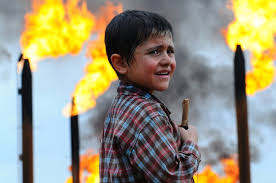
WIND AND FOG
Iran, 2011, 74 minutes, Colour.
Directed by. Mohammad Ali Talebi.
During the 1990s, Iran made quite a number of films that focused on little children. They had an international appeal as well and won many awards. They included The White Balloon, Children of Heaven and The Colour of Paradise. Wind and Fog seems a throwback to those times, but is welcome nonetheless.
The setting is the outbreak of the Iran-Iraq? war of the 1980s, a harsh and traumatic time for Iran, and still a subject for so many of the films coming from that country.
The basic plot here is timeless. A widowed father (from the war bombardments) brings his two children to stay with their grandfather in the mountains. He had previously worked on the gasfields. The little girl is bright and is solicitous for her younger brother who is not quite right mentally. He is bullied at school where she stands up for him. One day, during the hunting season, while the grandfather takes them fishing, the little boy comes across a wounded goose and is fascinated. Watching her brother and the goose is the occasion for flashbacks to their previous life where the little boy was also bullied as the children flew kites on the harsh and hot surroundings of the gas pipes.
Later, the girl is welcomed back at school, but the little boy goes off in the night to search for the goose and he becomes lost. His sister and a girl who had been hurtful search for the boy – aided by the flock of geese.
So, a film of charm as well as of people’s insensitivity, inviting audiences to be understanding and compassionate. The mountain and forest scenery is beautiful, a refuge from the war that has devastating effect elsewhere (and on the national psyche and memory).
Published in Movie Reviews
Published in
Movie Reviews
Tagged under
Saturday, 18 September 2021 20:01
American Mary
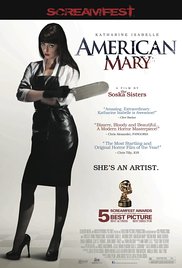
AMERICAN MARY
US, 2012, 103 minutes, Colouor.
Katharine Isabelle, Antonio Cupo
Directed by Jen Soska, Sylvia Soska.
Sounds innocent but beware. This is one of those popular torture horror films, better made than usual (and dedicated to Eli Roth, specialist in horror like Hostel). It may be difficult to watch because it is to do with surgical modification of people and not just hospital surgery.
Katharine Isabelle plays a precocious medical student specializing in surgery. She comes to the attention of some of her teachers whose motivations are not in accordance with medical ethics. She is struggling with debt problems. She finds herself in a situation, using her talents to help a victim surgically. She attracts the attention of a club owner and some of his staff and clientele and she is faced with a moral (and financial) dilemma: whether to accept the highly-paid but illegal and unethical jobs of modification she is offered – or not. No guessing what she decides. She does.
This leads to a number of surgical scenes, some quite explicit, others where the modifications are suggested (effectively). Because of the criminal connections of the club (which never seems to have many clients) and the malevolent intentions of the lustful doctors, she is assaulted and abducted. What is a girl to do? Abduct the lascivious doctor and submit him to gross surgery and abhorrent modifications.
So, many commentators have referred to this kind of film as ‘torture porn’. Defence is that it is telling a story vividly. Prosecution is whether this leads to indulgence in graphic mutilating violence.
Not a mainstream film but one which raises issues, for those who would wish to venture into this world, of themes and treatment and sensibilities.
Published in Movie Reviews
Published in
Movie Reviews
Tagged under
Saturday, 18 September 2021 20:01
Suspect Zero
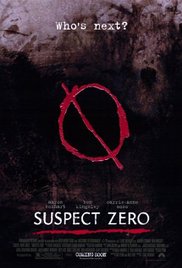
SUSPECT ZERO
US, 2004, 99 minutes, Colour.
Aaron Eckhart, Ben Kingsley, Carrie- Anne Moss, Harry Lennix, Keith Campbell.
Directed by E. Elias Merhige.
Suspect Zero is a police thriller, an FBI agent tracking down a serial killer across the United States but finding that on technicalities he was set free. The agent is played by Aaron Eckhart. Carrie- Anne Moss is his associate.
The agent has a capacity for looking into the future but there is another agent, in an institution, played by Ben Kingsley who also has the gift and continues to communicate messages to the agent, especially when there are further killings and the agent is trying to make connections to see whether a serial killer is at work.
The film has some suspense in its action, although audiences may work out what is happening before the final twist is revealed.
The film was directed by E. Elias Merhige who directed the offbeat story of the making of the silent German film, Nosferatu, Shadow of a Vampire, with John Malkovich and Willem Dafoe.
1. A serial killer film? Themes and vengeance? FBI agents? Powers out of the ordinary? The toll?
2. The title, the theory about the killer, going across the United States undetected? In fact in the plot of this film?
3. The New Mexico setting, the towns and the diners, homes, FBI Office, doctor’s surgery, institutes and rooms? The countryside, the roads, the isolated house? The musical score?
4. The visual style, the blend of the wheel and the surreal, the raid sequences and O’ Ryan’s seeing situations? Thomas seeing situations? The lectures? Work at home? Words and codes and close-ups? The exercise of the special powers? The consequences?
5. The effect on O’ Ryan, institutionalized, sending messages to Tom, his attending the religious service in the church and his tears? Tired, wanting to die?
6. The introduction, the sinister atmosphere, Harold as an ordinary travelling salesman, eating, the diner, getting a fright with a person at the window, O’ Ryan accosting him, showing him the pictures? Harold going to his car, O’ Ryan in the car, the crash, Harold’s death, the wreckage, Tom on the scene, lifting of the car and his commanding the worker to stop, the examination of the crime scene?
7. O’ Ryan, seeing his room, the maps, sending the messages, the teacher, the circle and the zero, the meaning, eyes being plucked from the victims, enlarged? Starkey, the rape attempt, his death?
8. Tom, his character, his arrival, his history, his mistakes, explaining his history, O’ Ryan’s room and all the documentation about Tom and his failure? Transferring to Albuquerque, the boss and his reaction, letter of the law and investigation? Bill and his help? His character, his pain, aches, ESP powers?
9. Fran, her arrival, the past relationship with Tom? The boss and his reaction? Talking to them both, their relationship, Fran wanting to be equal partner? Tom and his tendency to take over? The car, Harold’s death, the later visit to his wife, her not suspecting anything, the search and the discovery? The teacher, the photos, the boys, uncovering his crimes?
10. The effect on Tom, the puzzle, Fran and her help, visiting the rooms, the manager of the home, the other inmates, the bizarre experiences, O’ Ryan and his FBI claim, his name not being on the books?
11. What if… O’ Ryan was an agent and an avenger? O’ Ryan as a helper rather than a killer? The truck, the police pursuit, stopping O’ Ryan?
12. The meeting, the image of the mesa, the reality, the handcuffs? Audience judgment on O’ Ryan? The truck, the house, the chase, the crash? Tom, the cuffs, unsure? O’ Ryan explaining the selection of the agents, tests, their training, action in the field, breakdown and mental disorder?
13. The final confrontation between Tom and O’ Ryan, calling Fran, the other forces, O’ Ryan and his plea to die, seeing the future, his being shot?
14. Tom, his capacities, having seen O’ Ryan, his powers and their toll, his destiny?
Published in Movie Reviews
Published in
Movie Reviews
Tagged under
Saturday, 18 September 2021 20:01
Story of Us, The
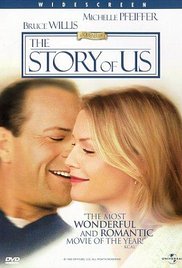
THE STORY OF US
US, 1999, 97 minutes, Colour.
Bruce Willis, Michelle Pfeiffer, Tim Matheson,
Directed by Rob Reiner.
As might be derived from the title, this is the story of a marriage. This is the perspective of the end of the 20th century, a century which has encouraged people to reflect on themselves, on love, on commitment and marriage – as well as highlighting the failures of so many marriages and consequent divorce with repercussions on the husbands and wives themselves, as well as on the children.
The film was directed by actor, Rob Reiner, best known for the son in All in the Family. He had an extensive career as a director, with a number of hits including When Harry Met Sally as well as the Stephen King thriller, Misery.
At this stage of their lives and careers, the two stars were 40 plus or minus, Bruce Willis having made an impact on television and made an extraordinary transition to the movies, becoming something of a superstar. Michelle Pfeiffer was almost 40 and also had strong status at this time as a movie star.
This means the performances are interesting but also the impact of the screen presence of the stars, audiences identifying with the performers and therefore being drawn into the action of the film itself, Bruce Willis and his laid-back approach, Michelle Pfeiffer a touch more intense – which means then that this is a film of interest about commitment and the breakdown of marriage.
1. The tone of the title? We and us? Marriage, love, sharing, breakdown?
2. The strength of the cast? Their reputations at the time of the film’s release? The career of Rob Reiner and his films?
3. The structure, the different times, the screenplay moving backwards and forwards? The present and the breakup, the memories and the cumulative effect of Ben and Katie’s life together, inter-cutting the episodes? The comment on each other?
4. The two at work, the jokes, the attraction, falling in love, going out, sharing, the excitement, an exuberant love?
5. The children, their birth, happy family, the glimpses, the children growing up?
6. The present, audiences observing the couple’s behaviour, at home, in front of the children, school, the celebration of the anniversary and its failure?
7. Ben, his love for Katie, becoming neglectful, insensitive over the years, his devotion to the family, his work, listening Katie or not?
8. Katie, her life, becoming hard, feeling alone, Ben’s sensitivity, falling out of love, covering for the sake of the family?
9. Her decision to oust Ben, his reaction, his living alone, the various phone calls, seeing the loneliness of each, the visits?
10. The comic theme of the parents, their influence, the surreal scene of both sets of parents in bed, the jokes, Katie’s mother and her being serious? Ben saying she was becoming like her mother?
11. Katie, her friends, the meals together, chatter, talking about sexuality, about divorce, their own experiences?
12. The separation but the visits, talking, concerned about the children and camp, the meals, his visit, Ben’s negative reaction?
13. The kids going to camp, taking them to the bus, Ben driving slowly behind the truck, Katie’s tension? The phone contact with children, their pride in the children?
14. Going to meet them, coming back, the reconciliation between the two, credible? Seeming easy after the separation? The importance of couples trying to reconcile?
Published in Movie Reviews
Published in
Movie Reviews
Tagged under